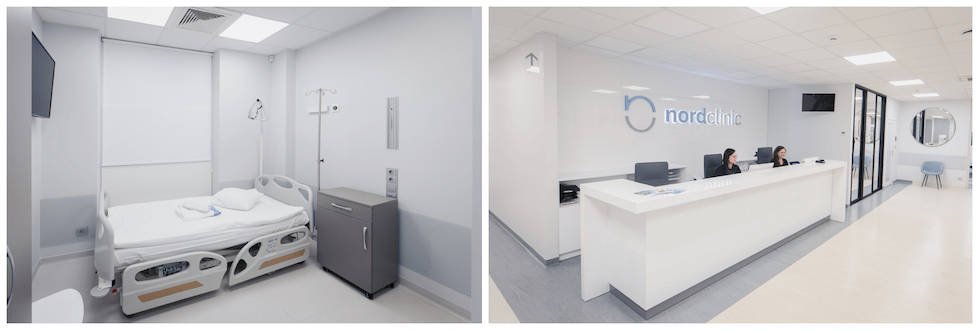Gastric Band Abroad: Lithuania
We are one of the leading bariatric surgery clinics for medical tourists in the European Union. We are proud of the fact that over 90 % of our patients come from the UK, Ireland, Norway, Sweden, Denmark, Germany, Switzerland and other countries.
See before-after pictures
Reviews and Facebook group
Our patients and clinic in the media
Prices
- Gastric band – 3.690 £
- Hiatal hernia repaired during weight loss surgery for FREE.
- Plastic surgery after a massive weight loss – from 580 £
Regular consultations with Prof. Almantas Maleckas in London
- accommodation with medical care – from 62 £ per night
- plastic surgeon consultation 12 months after surgery (if interested) – FREE
Regular price:
- consultation with the surgeon and anaesthesiologist
- all the necessary health tests before and after the surgery
- bariatric surgery
- anaesthesia
- hospital stay (1-3 days) with 24 hours medical care
- 24/7 personal assistance during your stay
- transfers to / from the airport, hotel and clinic
- diet instructions after bariatric surgery
- FREE dietician follow-up for 5 years (regular, not UK based)
Get your surgery for free by claiming a refund from your local health board. We cooperate with HSE and other health boards across the EU to help our Irish and EU patients receive a refund for their weight loss surgery in Lithuania. The clinic helps with the documents needed to claim a refund after following the EU directive route for medical treatment abroad.
Please note that the price of the surgery itself is provisional and may be accurately assessed only after the evaluation of each individual case.
The default currency at our clinic is EUR, so if you were looking at prices in GBP it may vary depending on GBP / EUR exchange rate at the moment of payment.
Things to consider when choosing a clinic and surgeon abroad:
- Is it a World-class surgeon with similar experience to ours (700 bariatric surgeries per year) ?
- Is bariatric staff available? We are one of the few clinics that has a specially trained bariatric nursing staff.
- Experience with bariatric anaesthesia? Anaesthesia of overweight patients requires skill and specialised experience, and our anesthesiologists have been specialising in bariatrics for over 15 years.
- Is it a multidisciplinary private hospital? Nordbariatric is a private clinic with modern facilities and exceptional care.
- Overall knowledge in the field? We have designed a unique bariatric mobile app. Our surgeon is the co-author of more than 40 scientific articles.
All of our patients can use one of our offers available at the moment.
- Additional services in our clinic. You or your accompanying persons can explore the various services by following this link. Customise your preferences and request to book any preferred procedures.
- Brand ambassador discount. If you have a community that would be interested in our services, you can now get a discount for your procedure by spreading the word about our clinic on your social media. Contact your customer service representative for more information.
- Recommendation discount. Get a discount for your next plastic or gynaecology procedure by recommending our clinic. Contact your customer service representative for more information.
- Gastric band – 4.200 €
- Hiatal hernia repaired during weight loss surgery for FREE.
- Plastic surgery after a massive weight loss – from 700 €
Regular consultations with Prof. Almantas Maleckas in London
- accommodation with medical care – from 74 € per night
- plastic surgeon consultation 12 months after surgery (if interested) – FREE
Regular price:
- consultation with the surgeon and anaesthesiologist
- all the necessary health tests before and after the surgery
- bariatric surgery
- anaesthesia
- hospital stay (1-3 days) with 24 hours medical care
- 24/7 personal assistance during your stay
- transfers to / from the airport, hotel and clinic
- diet instructions after bariatric surgery
- FREE dietician follow-up for 5 years (regular, not UK based)
Get your surgery for free by claiming a refund from your local health board. We cooperate with HSE and other health boards across the EU to help our Irish and EU patients receive a refund for their weight loss surgery in Lithuania. The clinic helps with the documents needed to claim a refund after following the EU directive route for medical treatment abroad.
Please note that the price of the surgery itself is provisional and may be accurately assessed only after the evaluation of each individual case.
The default currency at our clinic is EUR, so if you were looking at prices in GBP it may vary depending on GBP / EUR exchange rate at the moment of payment.
Things to consider when choosing a clinic and surgeon abroad:
- Is it a World-class surgeon with similar experience to ours (700 bariatric surgeries per year) ?
- Is bariatric staff available? We are one of the few clinics that has a specially trained bariatric nursing staff.
- Experience with bariatric anaesthesia? Anaesthesia of overweight patients requires skill and specialised experience, and our anesthesiologists have been specialising in bariatrics for over 15 years.
- Is it a multidisciplinary private hospital? Nordbariatric is a private clinic with modern facilities and exceptional care.
- Overall knowledge in the field? We have designed a unique bariatric mobile app. Our surgeon is the co-author of more than 40 scientific articles.
All of our patients can use one of our offers available at the moment.
- Additional services in our clinic. You or your accompanying persons can explore the various services by following this link. Customise your preferences and request to book any preferred procedures.
- Brand ambassador discount. If you have a community that would be interested in our services, you can now get a discount for your procedure by spreading the word about our clinic on your social media. Contact your customer service representative for more information.
- Recommendation discount. Get a discount for your next plastic or gynaecology procedure by recommending our clinic. Contact your customer service representative for more information.
Patient stories
Only we can offer:
One of the most experienced private bariatric clinic teams in Europe. More than 7.000 bariatric surgeries were performed by our surgeon to this date. A figure that no surgeon or clinic in a region can match.
The only clinic in Europe with a specially designed bariatric mobile app for patients after weight loss surgeries. Available in 6 languages on iOS as well as Android devices.
Watch Peter's gastric bypass story
Refund for EU patients
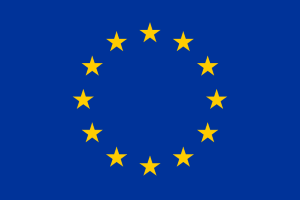
Get your surgery for free by claiming a refund from your local health board. The clinic helps patients with the documents needed to claim a refund after following the EU directive route for medical treatment abroad. It applies to patients who are insured under the systems of one of the EU countries and may not get the surgery due to long waiting times. On average our patients from the EU countries get fully refunded by their local health board in 3-5 months after their surgeries.
Bariatric Team

- Our surgeon Almantas Maleckas is a doctor of medical science
- UK General Medical Council (GMC) certified
- He performed over 7.000 bariatric operations
- A pioneer in laparoscopic surgery in the region
- More than 15 years working experience in Sweden, Gothenburg University hospital
- Works both in Lithuania and Sweden, speaks fluent English and Swedish
- London School of Economics graduate
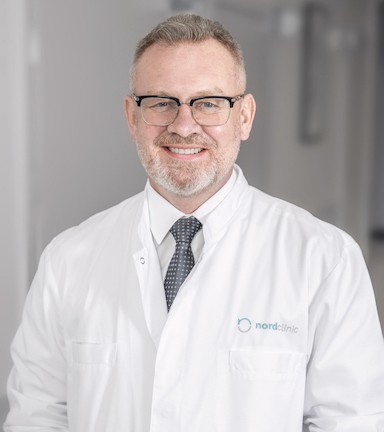
- Our surgeon Nerijus Kaselis is a doctor with a degree in medicine
- Member of the International Federation of Obesity
- Has been practising abdominal surgery for over 32 years, specialising in bariatric surgery for the past 18 years
- Was the first surgeon to perform various laparoscopic surgeries in Lithuania
- Works as a team lead of surgeons in complicated obesity surgeries abroad
- Has international work and study experience
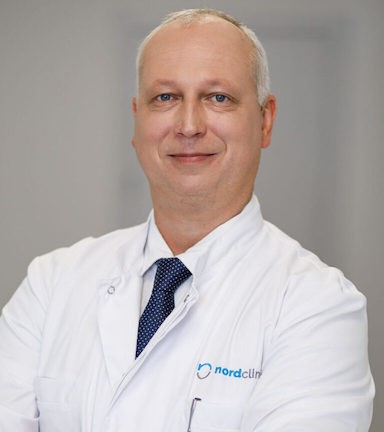
- Our surgeon Linas Venclauskas has over 15 years of experience
- Specialises in minimally invasive surgery, surgical treatment of the upper gastrointestinal tract and bariatric surgery
- Associate Professor at Lithuanian University of Health Sciences
- President of the Kaunas Society of Surgeons
- A member of the European Hernia Society
- Chairman of the Lithuanian Society of Hernia Surgery
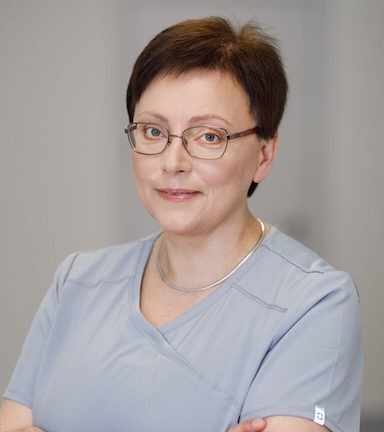
- Our surgeon Aurika Karbonskiene has over 25 years of experience as anesthesiologist
- Over 15 years of experience as a bariatric anesthesiologist
- Since 2008 – Associate Professor at Lithuanian University of Health Sciences
- Board member of Lithuanian Society of Anesthesiologists and Intensive Care Physicians
- Member of the European Society of Anesthesiology
- Researcher and coordinator at the Clinical Trial Network of European Society of Anesthesiology

- Our surgeon Almantas Maleckas is a doctor of medical science
- UK General Medical Council (GMC) certified
- He performed over 7.000 bariatric operations
- A pioneer in laparoscopic surgery in the region
- More than 15 years working experience in Sweden, Gothenburg University hospital
- Works both in Lithuania and Sweden, speaks fluent English and Swedish
- London School of Economics graduate

- Our surgeon Nerijus Kaselis is a doctor with a degree in medicine
- Member of the International Federation of Obesity
- Has been practising abdominal surgery for over 32 years, specialising in bariatric surgery for the past 18 years
- Was the first surgeon to perform various laparoscopic surgeries in Lithuania
- Works as a team lead of surgeons in complicated obesity surgeries abroad
- Has international work and study experience

- Our surgeon Linas Venclauskas has over 15 years of experience
- Specialises in minimally invasive surgery, surgical treatment of the upper gastrointestinal tract and bariatric surgery
- Associate Professor at Lithuanian University of Health Sciences
- President of the Kaunas Society of Surgeons
- A member of the European Hernia Society
- Chairman of the Lithuanian Society of Hernia Surgery

- Our surgeon Aurika Karbonskiene has over 25 years of experience as anesthesiologist
- Over 15 years of experience as a bariatric anesthesiologist
- Since 2008 – Associate Professor at Lithuanian University of Health Sciences
- Board member of Lithuanian Society of Anesthesiologists and Intensive Care Physicians
- Member of the European Society of Anesthesiology
- Researcher and coordinator at the Clinical Trial Network of European Society of Anesthesiology
5-year follow up with dietitian
Nutrition is one of the main focus after weight loss surgery to maximize weight loss and prevent weight gain. We offer a dietitian who will talk with you about the diet you’ll need to follow after surgery, explaining what types of food and how much you can eat at each meal. Karolina is a dietitian and Nutrition Consultant with a degree in the medical field. Read more about her here.
11 reasons that make us the most popular bariatric clinic abroad
Our team of 3 bariatric surgeons has 15-20 years of experience in the field in total performing over 500 different bariatric surgeries per year. Moreover, our surgeons are members of various prestigious surgical societies both Lithuanian and international. Our leading bariatric surgeon Dr Almantas Maleckas has performed more than 7.000 bariatric surgeries. He is fluent in four languages, among which English and Swedish. The surgeon has been regularly working in Sweden for over 15 years. Dr Maleckas is a pioneer of laparoscopic surgery in Eastern Europe and has trained many other bariatric surgeons in the region.
We are one of the leading bariatric surgery clinics for medical tourists in the European Union. We are proud of the fact that over 90 % of our patients come from the UK, Ireland, Norway, Sweden, Denmark, Germany, Switzerland and other countries.
We are trusted by our patients and we appreciate all the reviews and feedback collected over the years. Find testimonials here or on Google.
Already more than 5.000 of our former, current and future patients joined our online community with the aim to build a space for opinions and mutual support. Members are welcome to share experiences about their visit to the clinic and to discuss all surgery-related matters.
We offer a 5-year follow-up which includes being able to get in touch with our Lithuanian dietitian Karolina. She is consulting patients after surgery and is available upon request to answer postoperative nutritional questions for five years after surgery.
Our clinic is the only clinic that has developed its own app designed specifically for bariatric patients – Bariatric IQ. The most useful feature of this app is special bariatric diet recommendations based on a particular product, a patient’s gender, time after surgery and other factors. Such a feature has not been replicated by any other bariatric apps in the world. Read more and download the app on your IOS or Android smartphone here.
Our clinic works according to the highest standards set by the European Union. This helps to guarantee the quality of medical services. We care about the safety, comfort and successful results of our patients from all over the world.
The clinic helps patients with the documents needed to claim a refund after following the EU directive route for medical treatment abroad. It applies to patients who are insured under the systems of one of the EU countries and may not get the surgery due to long waiting times.
We provide customer service in 9 foreign languages including English, Swedish, Norwegian, Danish, Italian, Spanish, French, Russian, Polish. Everyone in our clinic speaks English, including nurses, assistants and the surgeon.
Combining different plastic surgery procedures to offer optimal treatment for post-bariatric patients has been our plastic surgery department’s specialisation for many years now. We have performed such surgeries for more than 10.000 patients to this date. Since weight loss patients often require multiple surgical procedures to address excess skin, surgery planning and surgeons’ experience are very important. We carefully select patients, evaluate each case individually, and only agree to combine surgeries within health & safety limits. Our team of 9 plastic surgeons performs more than 3.000 plastic operations a year, a number that no other clinic in Central & Eastern Europe can match.
Special bariatric app for your mobile phone
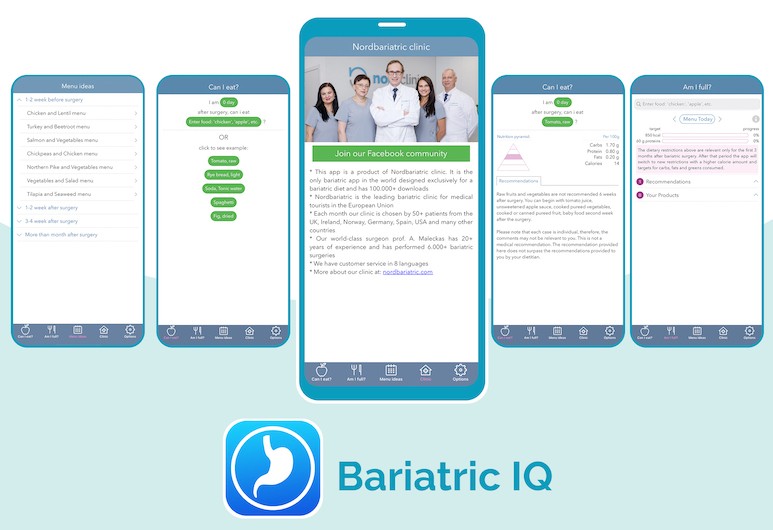
- Created by Nordbariatric clinic
- Special bariatric diet recommendations based on a particular product, a patient’s gender, time after surgery and other factors
- Available in 6 languages
- Available on iOS as well as Android.
- To this date the app was downloaded more than 100.000 times!
- Read more
Direct flights to Lithuania







Our clinic

Self-catered accommodation with medical care
What is a gastric band?
An adjustable gastric band, often called the band, is a bariatric surgery which helps patients lose as much as 40 percent of their excess weight. It is a minimally invasive, reversible and adjustable procedure. Food consumption is decreased by placing a silicone device (the so called band) around the top portion of the stomach. Its tightness can be adjusted by inflation or deflation through a port that is placed subcutaneously in the stomach.
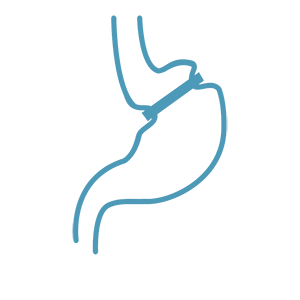
FAQ sessions with our surgeon
Watch full list of interview sessions on our Youtube channel.
How is a gastric band performed?
A gastric band is performed in 1 to 2 hours under general anesthesia. It is most commonly performed laparoscopically, or via keyhole surgery, since it is a fairly quicker and safer way of operating. Just a few incisions are made in the stomach area so that a surgeon can insert a laparoscope and other surgical instruments inside the abdomen. Then a gastric band is placed around the upper part of the stomach and sutured to keep it safely in place. An inflatable band divides the stomach into two parts. The upper part that has a connection to the oesophagus can temporarily store approximately one cup of food and is smaller than the lower pouch. A port that is attached to the band is placed under the skin of the abdomen so that a surgeon can access it later on and inject a saline solution. It changes the tightness of the band, and thus, the size of the passage from the upper pouch to the lower pouch of the stomach, which is important for digestion.
When would someone need a gastric band?
Gastric band procedure should be chosen when other weight loss strategies, such as exercising, diet changes, and medication, have failed to work. A qualified physician will evaluate the patient’s health and eligibility for a certain procedure and the best treatment option will be chosen. However, not every patient can qualify for gastric band surgery. Particular criteria should be met.
- A gastric band is only recommended in cases of severe obesity.
- A body mass index (BMI) score should be at least 35 in cases other medical conditions (diabetes, arterial hypertension or sleep apnea) are present and 40 if a patient does not have any other obesity-related health issues.
- Note that a gastric band surgery helps lose approximately 40 percent of one’s excess weight. The results depend greatly on each particular case and the patient’s dedication to adapt to lifestyle changes.
How does a gastric band compare to a gastric bypass or a gastric sleeve surgeries?
There are quite a few bariatric procedures to choose from. A gastric band, gastric sleeve and gastric bypass surgeries all possess certain advantages and disadvantages and vary greatly by the techniques used.
A gastric bypass and a gastric sleeve are both surgical procedures that are more invasive as compared to a gastric band surgery.
A bypass surgery, also known as a The Roux-en-Y gastric bypass, functions by changing digestive pathways and reducing absorption as well as volume of the stomach. Firstly, the stomach is divided into two pouches. The upper pouch can contain approximately 30ml of food and will function as a new stomach. Then, the small intestine is divided and a middle part of it is attached to the upper pouch (the one that connects to the oesophagus). The upper end is connected to the top portion of the divided small intestine so that the gastric and pancreatic enzymes, as well as the bile salts, can mix with the food and aid digestion.
Gastric sleeve surgery, or laparoscopic sleeve gastrectomy, works just by reducing the size of a stomach. Approximately 75 percent of the stomach is removed and a stomach acquires a sleeve-like shape. A reduced stomach size not only limits food intake but also the production of certain hunger hormones, such as gastrin and ghrelin.
Gastric sleeve surgery is irreversible, however, both bypass and sleeve result in more dramatic weight loss as compared to a gastric band. In addition to that, these techniques have gained more popularity in the recent years, presenting more favourable long-term results and less late complications. A gastric band, on the other hand, is reversible and less invasive, but has presented with more late complications. Recovery time and lifestyle changes are more or less similar for all three surgeries.
What are the challenges of a gastric band?
People who consider having gastric band surgery should be prepared for extreme dietary changes. The specific diet, which will be discussed below, should be strictly followed during the first 4 weeks after the surgery.
One of the most important aspects after gastric band surgery is post-surgery follow-ups. A patient will have the first visit after a week post-surgery and will have to visit a doctor every 4-6 weeks from then on. A physician will inject saline solution into the band through a port which was attached to a muscle wall just below the skin of the abdomen. It is extremely important for the band to be well-fitted.
Even though gastric band surgery is reversible it has one of the highest reoperation rates. Therefore, a patient should be prepared for potential additional surgery in case of the band malfunctioning. In rare cases, a band may erode into the stomach wall, get infected or slip.
What should I be prepared for?
Right after gastric band surgery a patient might feel sore, uncomfortable, and may feel mild pain in the region where the port was placed. The patient might also feel bloated. This is because a stomach was filled with gas so that a surgeon could have enough space to operate inside the abdomen.
For pain control the patients are usually prescribed painkillers, such as paracetamol.
The patient should expect to return to usual activities in about 2 to 4 weeks.
The patients should contact the clinic if they have experienced prolonged pain which is not alleviated with pain-killers, have nausea and vomiting or any other unusual symptoms, like an irregular heartbeat, high temperature, or palpitations.
In order to prevent malnutrition, food supplements should also be taken. The patient should prefer taking clinically tested vitamins and avoid less expensive multivitamin gummies, which usually lack certain vitamins. Multivitamins, vitamin D, vitamin B12, and calcium are often prescribed. A dietitian will ensure proper intake of all the necessary vitamins.
A successful recovery and weight loss requires active participation from the patient’s side. The patient should walk for at least 30 minutes a day and start other forms of exercise as soon as they feel comfortable to do so. Commonly chosen activities may include swimming or walking.
How will my life look like after gastric band placement?
Right after gastric band placement surgery, the patients might find it more comfortable to sleep in a slightly tilted position and some may prefer to sleep in their favorite armchair. The patient should be able to drive a week post-surgery if fastening the safety belt feels comfortable.
A patient should experience gradual weight loss. In order to maintain losing weight, the patient should maintain a specific diet which involves only liquid foods on the first week, blended meals on the second week and slow introduction to solid foods during the third and the fourth weeks. Participating in social life and engaging in active hobbies are also crucial aspects of the patient’s new lifestyle.
Women should avoid getting pregnant for the first 18 months following bariatric surgery. During pregnancy, the band is specifically adjusted to fulfill the needs of a mother and a developing baby.
What will I be able to eat after gastric band surgery?
Right after a surgery, a patient should only consume clear liquids, like water, teas, clear broth. Sugar should be avoided as it may contribute to a dumping syndrome, which is caused by a rapid influx of sugars. Coffee may worsen acid reflux, and thus, should be avoided too. Carbonated drinks should not be consumed since they cause gas formation.
On the second-week post-surgery a patient’s digestive system is still unable to handle solids, therefore, the patient should stick to dense liquids, like nutrition shakes, protein shakes, diluted broth, unsweetened milk, sugar-free yogurt, fruit juices (without any chunks). At the end of the second-week oatmeal may be introduced.
During the third and the fourth weeks, a patient should still avoid solid foods and should rather stick to unseasoned, caffeine-free, sugar-free, low-fat pureed products. Protein intake should be increased by this time. The patient may continue drinking protein shakes and introduce boiled or cooked eggs, jarred baby foods, pureed fish and avocados, hummus, mashed bananas, and other non-fibrous fruits. Remember to eat slowly and chew well.
On the fourth and fifth weeks solid foods may be added and a patient may move to three meals of soft food a day. Well-cooked chicken, fish and vegetables, sweet potatoes, low-fat dairy products, and low-sugar cereal are favorable choices. The patient should still avoid high-fat products, steaks, fibrous fruits, white potatoes, and other high-carb options. Caffeine may be reintroduced with moderation.
Does it have to be removed at some point?
A gastric band is supposed to last a lifetime and is clinically tested for a long-term use. Gastric band removal surgeries are kept to a minimal; however, sometimes it might need to be replaced, adjusted or removed because of malfunctioning. In rare cases, the band might erode into the stomach wall or slip from its primary position. The band might need to be removed if the patient experiences severe adverse symptoms, like malnutrition or gastroesophageal reflux (GERL).
How much weight can I expect to lose with the gastric band?
A gastric band surgery can help almost 80 percent of the patients. Band placement usually results in up to 50 percent loss of the excess body weight. That means if a patient is overweight by 200 pounds (~90kg) they can expect to lose as much as 80 pounds (~40kg). Weight loss results depend on patients themselves since they are directly responsible for strictly following dietary recommendations and other lifestyle changes.
What are the possible side effects or complications of this procedure?
The risk of complications can be reduced by choosing a well-experienced doctor and strictly following the treatment plan. Moreover, the risk is reduced significantly if a patient does not smoke and is eager to commit to a healthy lifestyle. Possible complications include:
Pouch dilation may have symptoms such as abdominal pain, nausea, reflux, and early satiety. It can be managed non-operatively by adjusting the tightness of the band.
Blood clots can form during general anaesthesia or during the recovery period because blood moves more slowly through the veins than usual. In order to prevent blood clots, a patient should wear compression socks, walk if possible and refrain from smoking both pre- and postoperatively.
Surgical site infections may occur intra-abdominally or in the superficial wounds. If any signs of infection are noticed, a patient should contact their hospital and seek for antibiotic treatment.
Send us your enquiry






